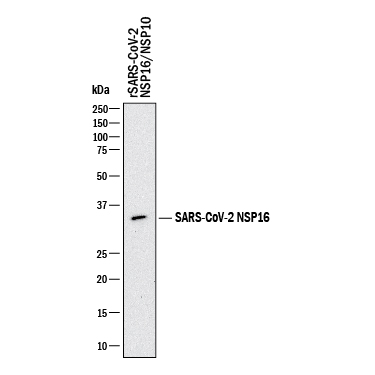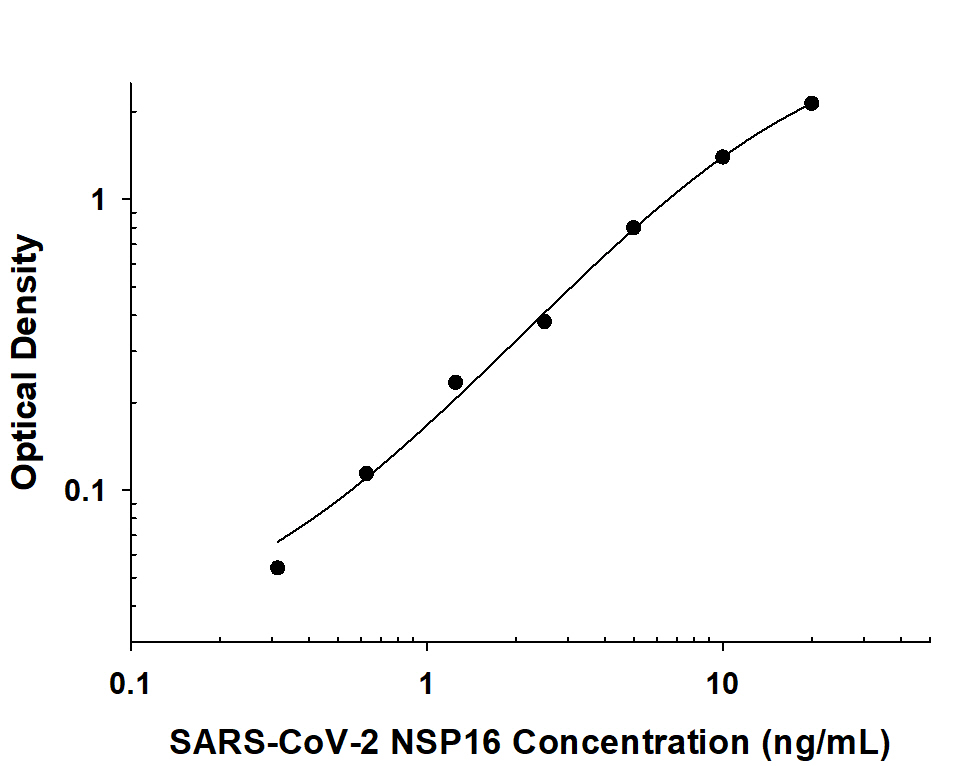SARS-CoV-2 NSP16/NSP10 His-tag Complex Antibody Summary
SARS-CoV-2 NSP16 (Ser1-Asn298) and SARS-CoV-2 NSP10 (Ala1-Gln139)
Accession # YP_009725311.1 and YP_009725306.1
Scientific Data
 View Larger
View Larger
Detection of SARS-CoV-2 NSP16/NSP10 by Western Blot. Western blot shows recombinant SARS-CoV-2 NSP16/NSP10. PVDF membrane was probed with 1 µg/mL of Mouse Anti-SARS-CoV-2 His-tag Complex Monoclonal Antibody (Catalog # MAB10941) followed by HRP-conjugated Anti-Mouse IgG Secondary Antibody (HAF018). A specific band was detected for NSP16/NSP10 at approximately 34 kDa (as indicated). This experiment was conducted under reducing conditions and using Western Blot Buffer Group 1.
 View Larger
View Larger
SARS-CoV-2 NSP16/NSP10 ELISA Standard Curve. Recombinant SARS-CoV-2 NSP16/NSP10 protein was serially diluted 2-fold and captured by Mouse Anti-SARS-CoV-2 His-tag Complex Monoclonal Antibody (Catalog # MAB10941) coated on a Clear Polystyrene Microplate (Catalog # DY990). Mouse Anti-SARS-CoV-2 NSP16 Monoclonal Antibody (Catalog # MAB10940) was biotinylated and incubated with the protein captured on the plate. Detection of the standard curve was achieved by incubating Streptavidin-HRP (Catalog # DY998) followed by Substrate Solution (Catalog # DY999) and stopping the enzymatic reaction with Stop Solution (Catalog # DY994).
Reconstitution Calculator
Preparation and Storage
- 12 months from date of receipt, -20 to -70 °C as supplied.
- 1 month, 2 to 8 °C under sterile conditions after reconstitution.
- 6 months, -20 to -70 °C under sterile conditions after reconstitution.
Background: NSP16/NSP10
Non-structural protein 16 (NSP16) and NSP10 are two of several functional proteins released by ORF1a-encoded protease cleavage of the pp1a and pp1ab replicase polyproteins expressed from the coronavirus (CoV) genome (1). The NSPs are involved in the replication and transcription of the viral RNA and not incorporated within the virion particles. Coronaviruses include various highly pathogenic strains such as SARS-CoV, MERS-CoV and SARS-CoV2 that have had significant impact on humans as well as strains that have negatively impacted livestock. NSP16 is a small monomeric 298 amino acid protein with a characteristic fold of the class I methyltransferase (MTase) family with a seven-stranded B-sheet surrounded by alpha-helices and loops that bind the cap and form a cap-binding groove and S-adenosylmethionine (SAM) cleft (2,3). NSP10 is a small 139 amino acid protein capable of forming independent dodecameric structures composed of four identical trimers where each monomer is capable of binding two zinc ions (4,5). Both the NSP16 and NSP10 SARS-CoV2 sequences are highly conserved across coronaviruses (3). NSP16 catalyzes 2'-O-MTase activity specifically on capped N7-methylated RNA through methylation of the 2'-hydroxy group of adenine using SAM as a methyl donor (6). The viral RNA cap structure protects it from degradation, promotes mRNA translation, and prevents the viral RNA from being recognized by innate immune mechanisms (7). NSP16 was shown to interact strongly with NSP10 (8) in a monomeric form via hydrophic interactions and hydrogen bonds in the interface (3). The MTase activity of NSP16 requires interaction with NSP10 (2,7). NSP10 interaction extends and narrows the RNA-binding groove that accommodates the substrate and stabilizes NSP16 (2,3,9). The dimerization interface between NSP16 and NSP10 is critical and can be used as a target to effectively reduce replication and pathogenesis (10,11).
- Snijder, E.J. et al. (2016) Adv. Virus Res 96:59.
- Chen, Y. et al. (2011) PLoS Pathog. 7:e1002294.
- Rosas-Lemus, M. et al. (2020) bioRxiv In press.
- Matthes, N. et al. (2006) FEBS Lett. 580:4143.
- Su, D. et al. (2006) J. Virol. 80:7902.
- Bouvet, M. et al. (2012) Proc. Natl. Acad. Sci. U.S.A. 109:9372.
- Decroly, E. et al. (2011) PLoS Pathog. 7:e1002059.
- Pan, J. et al. (2008) PLoS One 3:e3299.
- Bouvet, M. et al. (2014) J. Biol. Chem. 289:25783.
- Ma, Y. et al. (2015) Proc. Natl. Acad. Sci. 112:9436.
- Wang, Y. et al. (2015) J. Virol 89:8416.
Product Datasheets
FAQs
No product specific FAQs exist for this product, however you may
View all Antibody FAQsReviews for SARS-CoV-2 NSP16/NSP10 His-tag Complex Antibody
There are currently no reviews for this product. Be the first to review SARS-CoV-2 NSP16/NSP10 His-tag Complex Antibody and earn rewards!
Have you used SARS-CoV-2 NSP16/NSP10 His-tag Complex Antibody?
Submit a review and receive an Amazon gift card.
$25/€18/£15/$25CAN/¥75 Yuan/¥2500 Yen for a review with an image
$10/€7/£6/$10 CAD/¥70 Yuan/¥1110 Yen for a review without an image

